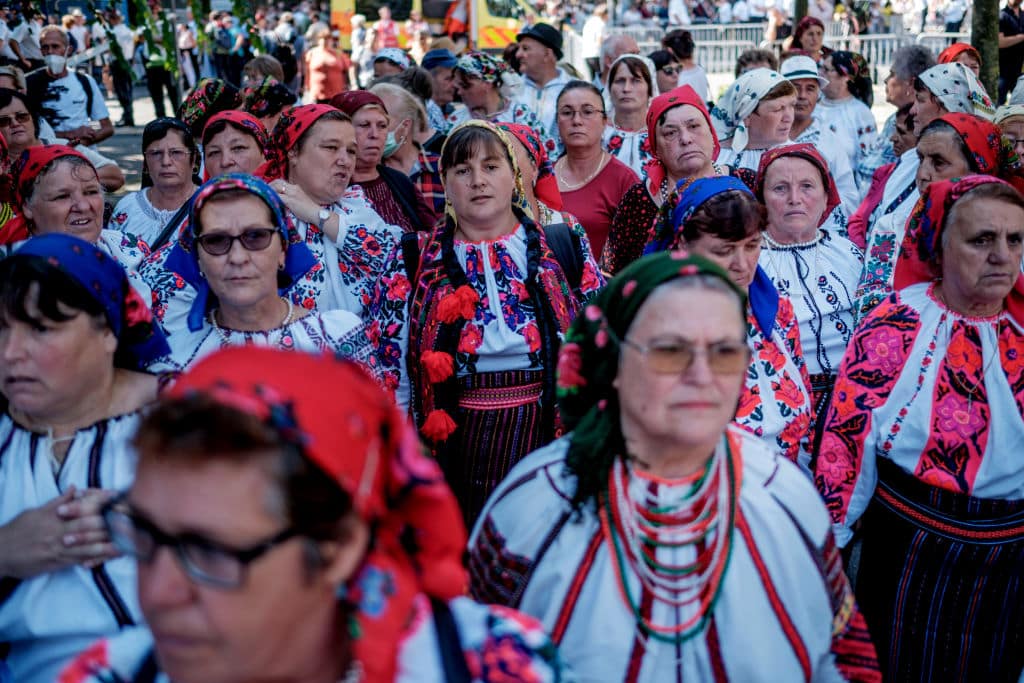Hungary has helped more than two million persecuted Christians through a government-funded aid scheme, according to a prominent Hungarian politician.
Tristan Azbej, the State Secretary for the Aid of Persecuted Christians, a position within Hungary’s Ministry of Foreign Affairs, announced that the aid was administered through the Hungary Helps programme, launched in 2017.
He made the <a href="https://dailynewshungary.com/hungarys-government-over-2-million-persecuted-christians-already-helped/"><mark style="background-color:rgba(0, 0, 0, 0)" class="has-inline-color has-vivid-cyan-blue-color">announcement</mark> </a>during a recent visit to the United States, where he also met with leaders from various Christian diaspora groups from Eastern Europe during visits in Chicago and other Midwestern areas. He also met with Chaldean Catholics from Iraq, who expressed gratitude for Hungary’s efforts in reconstructing a Chaldean Catholic settlement on the Nineveh Plains.
In recent years, Hungary has stood out as a country publicly concerned with the plight of Christians. The Fidesz party, led by Prime Minister Viktor Orbán, governs in coalition with the Christian Democratic People’s Party (KDNP). While Fidesz has championed Christian values and promoted a strong sense of cultural Christianity, the KDNP goes further, defining itself within the parameters of Christian ethics, including a pro-life stance, emphasis on traditional family values and support for religious institutions.
At the 2017 International Consultation on Christian Persecution held in Budapest, Orbán <a href="https://2015-2022.miniszterelnok.hu/prime-minister-viktor-orbans-speech-at-the-international-consultation-on-christian-persecution/"><mark style="background-color:rgba(0, 0, 0, 0)" class="has-inline-color has-vivid-cyan-blue-color">acknowledged</mark></a> that the “persecution of Christians in Europe operates with sophisticated and refined methods of an intellectual nature”, which is “unfair” and “discriminatory”. Though he noted that this persecution “cannot be compared to the brutal physical persecution which our Christian brothers and sisters have to endure in Africa and the Middle East”.
<a href="https://thecatholicherald.com/iraqs-historic-christian-heartland-slowly-recovering-from-isis-occupation/"><mark style="background-color:rgba(0, 0, 0, 0)" class="has-inline-color has-vivid-cyan-blue-color"><em><strong>RELATED: Iraq’s historic Christian heartland recovering from ISIS occupation</strong></em></mark></a>
Conversely, the European Union has refused to implement programmes specifically targeting persecuted Christians, despite Christianity being the most persecuted religions globally.
The EU has, however, appointed a <a href="https://commission.europa.eu/strategy-and-policy/policies/justice-and-fundamental-rights/combatting-discrimination/racism-and-xenophobia/combating-antisemitism/coordinator-combating-antisemitism-and-fostering-jewish-life_en"><mark style="background-color:rgba(0, 0, 0, 0)" class="has-inline-color has-vivid-cyan-blue-color">coordinator</mark></a> for Combating Antisemitism and Fostering Jewish Life, and a <a href="https://ec.europa.eu/newsroom/just/items/774811/en"><mark style="background-color:rgba(0, 0, 0, 0)" class="has-inline-color has-vivid-cyan-blue-color">coordinator</mark></a> for Combating Anti-Muslim Hatred – yet no such position has been created for Christians. Similarly, the EU has also enacted various programmes to counter antisemitism and Islamophobia but currently has no initiatives aimed at reducing anti-Christian sentiment.
On the domestic front, Hungary has introduced a wave of pro-Christian policies. The 2011 Fundamental Law of Hungary recognises “the role of Christianity in preserving the nation”, with a 2018 amendment further emphasising the protection of Hungary’s “constitutional identity and Christian culture”.
Alongside this, financial incentives have been introduced to encourage families, one of the most notable being an income tax exemption for mothers with four or more children, and which lasts for life.
This has contributed to Hungary being one of the few Western countries to see significant improvements in its birth rate, which reached a 25-year high in 2021.
Despite concern for the plight of Christians, Orbán’s government has been reluctant to accept migrants into the country, preferring instead to work towards greater safety for persecuted Christians in their respective homelands. In a 2018 <a href="https://www.amnesty.org/en/latest/news/2018/02/turning-orbans-hateful-rhetoric-into-reality/"><mark style="background-color:rgba(0, 0, 0, 0)" class="has-inline-color has-vivid-cyan-blue-color">speech</mark></a>, he stated: “Migration and mass population movement are bad, dangerous things which we want no part of.”
This anti-migrant stance has led to fierce clashes with the EU. In June 2024, the European Court of Justice (ECJ), the highest judicial authority of the European Union, imposed a €200 million fine on Hungary. This was followed by an additional fine of €1 million per day for the country's continued refusal to comply with EU migration regulations.
The ECJ <a href="https://curia.europa.eu/jcms/upload/docs/application/pdf/2024-06/cp240099en.pdf"><mark style="background-color:rgba(0, 0, 0, 0)" class="has-inline-color has-vivid-cyan-blue-color">described</mark></a> Hungary’s evasion of the EU’s common asylum policy as an “unprecedented and exceptionally serious breach of EU law”.
Orbán <a href="https://abouthungary.hu/blog/hungary-is-seeking-legal-ways-to-challenge-the-eu-court-s-unjust-fine"><mark style="background-color:rgba(0, 0, 0, 0)" class="has-inline-color has-vivid-cyan-blue-color">responded</mark></a> by calling the ruling “outrageous and unacceptable”, asserting that Hungary would not yield to “financial blackmail by Brussels bureaucrats”.
Azbej also used his US visit to urge Hungarian Americans to continue supporting relations between the two countries, “especially in light of the resurgent Hungary-US ties”, a nod at the notably close relationship between President Donald Trump and Orbán.
<em>Photo: Catholic pilgrims attend a large-scale, open-air Mass with Pope Francis on the first day of a four-day visit by the Pope to Hungary and Slovakia in Budapest, Hungary, 12 September 2021. (Photo by Janos Kummer/Getty Images.)</em>



